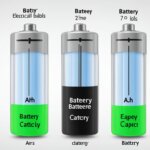Table of Contents
Welcome to our comprehensive guide on amp hours, an essential factor to consider when shopping for batteries. Whether you’re in search of a battery for your RV, boat, or solar power system, understanding amp hours is vital for determining battery capacity and making an informed decision. In this guide, we’ll delve into the significance of amp hours in relation to battery performance and capacity, equipping you with the knowledge to choose the right battery for your needs.
So, what exactly are amp hours? Amp hours are a rating that reflects the capacity of a battery, indicating how much amperage it can provide for one hour. These ratings are primarily found on deep cycle batteries designed for continuous power supply. It’s important to note that starting batteries may not have amp hour ratings, as they are not intended for continuous use.
When comparing batteries, it becomes crucial to consider the amp hour rating along with the battery’s C rating. The C rating indicates the number of amp hours a battery can deliver over a specific period of time. For example, a battery may provide 26.8 amp hours at the C/5 rating, meaning it can supply 26.8 amps over a 5-hour duration without a significant drop in performance. Alternatively, the same battery could provide 36 amp hours over a period of 100 hours. Choosing the appropriate C rating is essential when comparing amp hours based on your specific usage requirements.
It’s recommended to use the C/20 rating as a benchmark if you’re unsure which rating to consider. This rating provides a general understanding of the battery’s performance under typical usage conditions.
Stay tuned to our guide as we explore the relationship between amp hours and battery performance and cover how to compare amp hours and battery capacity effectively. Whether you’re a seasoned battery enthusiast or new to the world of batteries, this guide will equip you with the essential knowledge to make informed battery shopping decisions.
Amp Hours and Battery Performance
The performance of a battery is closely tied to its amp hour rating and discharge rate. Understanding this relationship is crucial for optimizing battery efficiency.
Rapidly discharging a battery with a higher C rating can cause it to generate heat, which ultimately leads to decreased performance. The heat produced during rapid discharge negatively impacts the battery’s efficiency and may even shorten its lifespan.
On the other hand, batteries with lower C ratings discharge at a gentler pace, resulting in more efficient delivery of their amp hours. These batteries are able to maintain their performance levels without generating excessive heat.
When comparing amp hours and battery performance, it’s important to consider the intended use of the battery. For applications that require daily and continuous usage, a battery with a higher C rating may be more suitable. This allows the battery to provide the necessary power without experiencing significant voltage drops or efficiency losses.
However, for sporadic or intermittent usage, a battery with a lower C rating can deliver sufficient power without compromising efficiency. These batteries are able to handle lower discharge rates without generating excessive heat, making them a reliable choice for occasional use.
By selecting the appropriate battery based on its amp hour rating and discharge rate, you can ensure optimal battery performance for your specific needs. Whether it’s powering a high-demand device or providing backup power for emergencies, understanding the relationship between amp hours and battery performance is essential to maximize battery efficiency.
| Battery | Amp Hour Rating | Discharge Rate (C Rating) | Performance |
|---|---|---|---|
| Brand A | 50Ah | C/10 | Excellent |
| Brand B | 75Ah | C/5 | Good |
| Brand C | 100Ah | C/2 | Average |
Comparing Amp Hours and Battery Capacity
Understanding amp hours is essential when comparing battery capacity. The amp hour rating indicates the battery’s ability to deliver a specific number of amps in one hour. It is measured in milli-amp hours (mAh) for small batteries like those used in personal vaporizers or AA-sized batteries, and in amp hours (Ah) for larger batteries.
The capacity of a battery is determined by its ability to deliver amperage over time, which varies based on different C ratings. When comparing different batteries, it’s important to consider the intended usage period and select the appropriate C rating for accurate comparison.
Batteries with higher amp hour ratings and lower C ratings are generally better suited for longer and continuous usage, while batteries with lower amp hour ratings and higher C ratings are more suitable for shorter and sporadic usage. It’s recommended to choose batteries with amp hour ratings that match your specific usage requirements to ensure optimal battery performance.
FAQ
What are amp hours?
Amp hours are a rating used to measure the capacity of a battery and determine how much amperage it can provide for one hour.
Are amp hour ratings important for all batteries?
Amp hour ratings are usually displayed on deep cycle batteries, which are designed to provide continuous power. Starting batteries may not have amp hour ratings as they are not intended for continuous use.
How do I compare batteries based on amp hour ratings?
When comparing batteries, it is important to find the amp hour rating and consider it in relation to the battery’s C rating. The C rating indicates how many amp hours the battery can provide for a specific period of time.
What is the significance of the C rating?
The C rating indicates how many amp hours the battery can provide for a specific period of time. It helps determine the battery’s performance and capacity.
What does it mean if a battery has a C/5 rating?
A battery with a C/5 rating can safely provide its amp hour rating over a 5-hour duration without dropping off.
How should I select the appropriate C rating for battery comparison?
If you’re unsure which C rating to use, it’s best to go with C/20 as it provides a general sense of battery performance.
How does the discharge rate affect battery performance?
Rapidly discharging a battery with a higher C rating can cause it to produce heat, resulting in decreased efficiency. Batteries with lower C ratings are more efficient in delivering their amp hours as they discharge at a gentler pace.
Should I choose a battery with a higher C rating for daily use?
If daily use is required, a battery with a higher C rating may be more suitable.
Are batteries with lower C ratings suitable for sporadic usage?
For sporadic usage, batteries with lower C ratings can provide sufficient power without compromising efficiency.
How do I ensure optimal battery performance when shopping for batteries?
It is recommended to choose batteries with amp hour ratings that match your specific usage requirements to ensure optimal battery performance.







